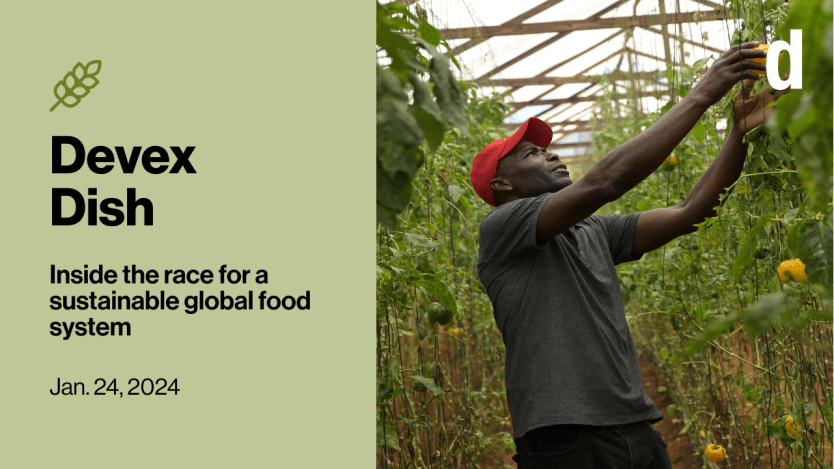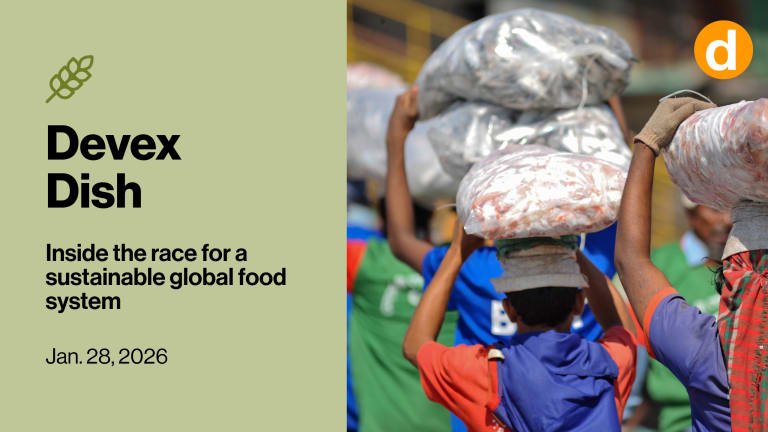Devex Dish: How the World Bank is investing in food security and nutrition

Agricultural ministers at last week’s Global Forum for Food and Agriculture in Berlin, Germany, got a bit of a sneak peek at a new World Bank program – and so did Devex. Julian Lampietti, the bank’s manager for global agriculture practice, previewed the upcoming Global Challenge Program on Food and Nutrition Security, which is only one aspect of the bank’s multibillion-dollar effort to improve global food security.
The program aims to steer public spending toward sustainable food systems and mobilize private funding as well. It has three main pillars.
• Improving early warning systems and making it easier for people facing food insecurity to purchase supplies early in a crisis.
• Improving nutrition — particularly for kids and newborns within the first 1,000 days of life — to avoid what Lampietti called a “lifelong cost” if their needs are not met.
• Changing how food is produced. That means nudging governments to move away from subsidies for unhealthy products, like sugar, and instead think about supporting healthier crops or making investments that might help farmers adapt to climate change.
The details of the program are still being worked out, but it clearly reflects World Bank President Ajay Banga’s commitment to improving food and nutrition security as one of his eight “global challenges.”
This is a preview of Devex Dish
Sign up to this newsletter to get the inside track on how agriculture, nutrition, sustainability, and more are intersecting to remake the global food system in this weekly newsletter.
Meanwhile, the bank has made $45 billion available to scale up its food and nutrition security response since May 2022. That money has contributed to short- and long-term programs across 90 countries, benefiting an estimated 335 million people.
The bank has invested in a range of interventions, including:
• $2.75 billion to help countries in eastern and southern Africa improve the resilience of their food systems.
• Programs in Honduras that are benefiting small-scale farmers by improving their connections to markets and helping them adapt to new technologies, while also helping improve food security for the country’s most impoverished households.
• A $200 million grant in Madagascar to upgrade water supplies in a drought-prone region of the country.
Read: Inside a new World Bank program to boost food security (Pro)
+ The World Bank and other multilateral development banks have stepped up their focus toward global food security recently. Learn more about what to expect from development finance in 2024 at our Devex Pro Live event today at 12 p.m. ET (6 p.m. CET). Can’t attend live? Register anyway and we’ll send a recording.
Not yet a Pro member? start your 15-day free trial now to access all our exclusive content.
Crop support
Thanks to climate change, African farmers are threatened with erratic rainfall, droughts, flooding, and soil erosion. Yet subsidized agri-insurance is only available in four of Africa’s 54 countries.
The One Acre Fund is looking to change that with a reinsurance program that the social enterprise launched last month, Devex contributor Rebecca Holland writes. The goal is to provide a safety net for at least 4 million African smallholder farmers by 2030 by covering crop damage that occurs in extreme weather.
The organization’s leaders say they are filling a role that has largely been neglected in Africa. With standard insurance rates far too high for most African farmers, they’ve often simply been forced to go without. But by directing its funds to subsidizing their insurance offering, the new One Acre Fund Re is hoping to spur a revolution in financial protection for farmers.
Read: Inside One Acre Fund’s reinsurance fund for African smallholder farmers
Cashing in
Bringing home the bacon
Your next job?
Policy and Communications Lead
Access to Nutrition Initiative
Netherlands | Switzerland | United Kingdom
A disturbing trend in India offers a glimpse into how farmers are coping with climate change in the absence of insurance programs.
With heat waves and downpours increasingly destroying Indian farmers’ crops, the only thing standing between them and complete devastation is often their wives’ gold jewelry. Farmers use the jewelry as collateral to secure loans that allow them to continue to buy food and send their children to school, writes Disha Shetty for Devex.
The problem, though, is that the jewelry is often given to women when they are married to ensure they have some form of personal financial security. But those same women are not given a choice when it comes to offering up the gold as loan collateral.
It is an impossible situation, as women want to ensure their families are able to survive, but often don’t have ownership of the land or any say in how farming is practiced. And while the loans can be crucial to keeping families afloat, they often come with impossible interest rates that can all but ensure some women never see their gold again.
Read: Women’s jewelry acts as a buffer against climate change in India
The ground beneath our feet
“Our relationship with nature needs to be redefined, and that will have to start with businesses. That extractive mindset of ours needs to be shifted to a management mindset.”
— Ibrahim Thiaw, executive secretary, United Nations Convention to Combat DesertificationThiaw was reacting to the new star at this year’s World Economic Forum meeting in Davos, Switzerland: the soil. For the first time, the meeting of the world’s foremost movers and shakers included a panel on soil management, with a particular emphasis on soil degradation. Given all the high-powered government officials and business leaders present, Davos offered a crucial forum for discussing how the public and private sector can come together to address this issue, as Devex contributor Laura Secorun writes.
Read: Davos short on climate pledges, but sparks talks on tech, soil, health
+ Get more insider reports and analysis from Davos with Davos Dispatch, a selection of special episodes focusing on the summit for our This Week in Global Development podcast. Subscribe here to get updated on new episodes.
Chew on this
Due to complex pricing agreements, a surge in cocoa prices did not benefit sellers in countries responsible for the majority of the crop’s sales, while smaller growers saw a surge in profits. [Bloomberg]
As China moves to shore up its food security, the government is turning to allies like Brazil for support even as it reclaims domestic farmland. [Financial Times]
To prevent a disease caused by the rice yellow mottle virus from wiping out Africa’s rice crop, researchers are looking at editing genes into the grains to make crops resistant to infection. [Food Navigator Europe]
A welfare program for giving out subsidized food in low-income communities in India adopted an AI tool to weed out ineligible recipients, but the algorithm wrongly removed thousands of legitimate ones instead, leaving them without much-needed aid. [Al Jazeera]
Search for articles
Most Read
- 1
- 2
- 3
- 4
- 5








